Shame at the United Nations
By Barrington M. Salmon -Contributing Writer- | Last updated: Apr 20, 2016 - 8:03:13 PMWhat's your opinion on this article?
‘The most desperate people in this world are being exploited’
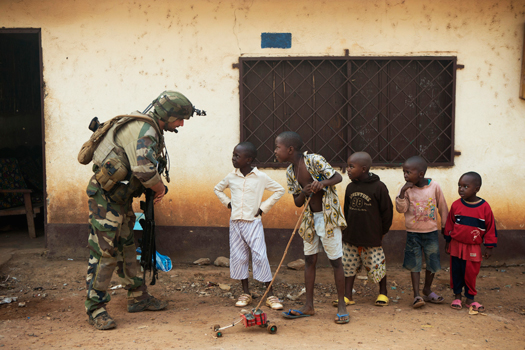
|
WASHINGTON—For the past several months, the United Nations has been pilloried by non-governmental organizations, human rights groups and others as the world learns about almost-daily reports of sexual abuse allegations involving peacekeepers and UN staff.
In early April, the UN received more bad news. Four children told a UN official that a French (Sangaris) military commander tied them up, undressed them and forced them to have sex with a dog in exchange for food the equivalent of about $9. This latest revelation has cast yet another harsh spotlight on the international organization tasked since 1947 with fostering and furthering peace, security and human rights globally.
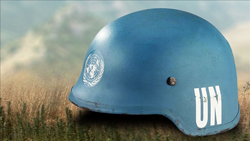
|
There are also other allegations from local leaders and victims in one province in the Central African Republic that troops from France and Gabon had sexually abused several girls. Meanwhile, elsewhere in the country, a Congolese peacekeeper was detained after the mother of a 16-year-old girl told local police on March 28 that he had raped the young woman in a hotel room.
The alleged abuse occurred in between 2013 and 2015 in the Kemo prefecture of the CAR. UN officials said “integrated-multidisciplinary assessment teams” have been dispatched and are interviewing victims and gathering pertinent information surrounding the allegations lodged against members of MINUSCA, the UN peacekeeping force.
The revelations have led to promises by Secretary General Ban Ki-moon of thorough investigations and a zero-tolerance stance, assurances of change and pointed criticism from some like Paula Donovan of the Code Blue Campaign. Her organization has, for the past two years, been a thorn in the UN’s side with unrelenting demands for greater transparency and accountability.

|
Ms. Donovan, a co-director of AIDS Free World, through the Code Blue Project has been deeply critical of the UN’s inability or unwillingness to tackle the problem and hold the appropriate individuals, entities and countries accountable.
“I think this is a horrible crisis and the United Nations is mismanaging it in an awful way. There is no transparency and no thoughtful, legal response,” said Ms. Donovan. “It is definitely incompetence and mismanagement which stems from a conflict of interest. Civilians and the military have been accused of crimes.”
“The UN is claiming they’re providing support to victims while trying to substantiate their claims. They cannot conduct criminal investigations and send teams to interview victims over and over again. There’s nowhere else on earth where employees accused of criminal activity do the interviews and interact with victims.”
Ms. Donovan, who has spent more than three decades working to advance women’s and children’s rights, both within the UN system and as an advocate for change, said UN staff in affected countries get cursory investigative training and the UN has developed an ad hoc system of speaking to victims of sexual abuse.
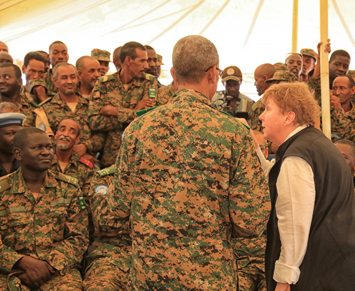
Jane Holl Lute 9 (center right) UN special coordinator on improving the UN response to sexual exploitation and abuse with Central African Republic peacekeepers.
|
“They need to fundamentally change the system,” said Ms. Donovan, who previously served as the UN special envoy on HIV/AIDS in Africa and who has worked with UNICEF and the UN Development Fund for Women. “We have succeeded in bringing this to light. The UN has been required to respond to the public and share information they used to keep completely hidden. The system is fundamentally flawed and the system has failed.”
She added, “The whole system is not set up to respond to crimes or deal with personnel, civilian staff members, police and experts around these issues. This has been going on for decades. It’s because of our pressure that member states want to take this on. When (Secretary General) candidates are being interviewed this week, they will be asked questions about sexual exploitation and abuse. It is a top priority question by many governments.”
According to figures compiled by the Code Blue Campaign, 98 women and girls living in a single province in the Central African Republic reported to UNICEF that they were sexually exploited and abused by international peacekeepers made up of soldiers attached to the UN, France and the African Union. On March 13, Code Blue issued a press release revealing that an additional 41 women and girls have accused peacekeepers of sexually abusing them.
UN officials have determined that members of the Gabon and Burundi contingents as well as those in the French Sangaris forces stationed in the same area are most likely involved in the abuses. UN Secretary-General Ban Ki-moon last August fired the CAR mission chief as more allegations were reported but that has done little to stem mounting criticism as new charges are brought.
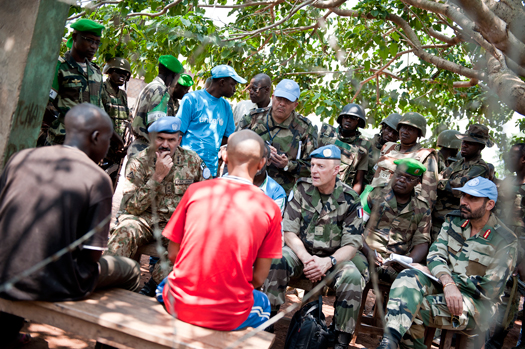
|
Critics demand action not words
A senior official with the United Nations said during a recent interview that the organization is handling an unfortunate, unwieldy, complex situation in an as effective a manner as possible.
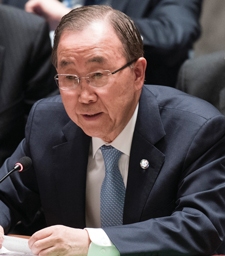
Secretary-General Ban Ki-moon addresses Security Council meeting on sexual exploitation and abuse in UN peacekeeping operations.
|
“It is quite a complicated issue. It has been an issue in the UN for more than 10 years,” said the official who spoke on condition of anonymity. “We do indeed have a problem. The secretary general has been reporting to the General Assembly the steps we’re taking. The issue is that this is a member state operation. Accountability and responsibility fall to member states, not to us. When a peacekeeping mission is called, we call on the 193 member states for troops.”
The official said troop contributions come primarily from India, Bangladesh and many African countries with smaller numbers coming from industrialized nations.
“I’m not speaking for the secretary general but he has been definitely very vocal and he’s been calling on member states to take a greater role,” the official said. “We can’t take this on, enact policies without their help. Allegations are being reported more because of our efforts, especially in the Central African Republic. During this investigation, we went beyond to go and reach out to communities in far out towns and villages.”
Bea Edwards said she doesn’t buy the UN’s argument.
“It’s disingenuous to ask member states to solve this problem,” said Ms. Edwards, director of the Government Accountability Project in Washington, D.C., an organization which seeks to protect whistleblowers. “There’s such violence in the Congo, the Central African Republic and South Sudan but the Security Council doesn’t take meaningful action. They put troops from neighboring countries there, allow it to deteriorate and then blame it on contributing countries. Central Africa is a problem and there’s no political will to address those problems.”
“There is an undercurrent of race … It goes back to colonialism where they drew fake countries and triggered all kinds of ethnic conflict. There is oil, gold and other natural resources so there’s a definite advantage to keeping the conflict going. Corporate, financial and military interests, as well as arms dealers—primarily the U.S., France and the Israelis—are benefitting.”
Both Ms. Edwards, former UN employee Peter Anthony Gallo, and the anonymous senior UN official agree that there may not necessarily be more abuses taking place, it’s just that more are being reported.
Crisis and chaos in the Central African Republic
According to Amnesty International, the Central African Republic is currently embroiled “in a human rights and humanitarian crisis of historic proportions.” Amnesty International researchers have documented sectarian killings, ethnic cleansing, war crimes and crimes against humanity as Muslims are subjected to reprisals and violence from anti-balaka (anti-machete) Christian militia groups.
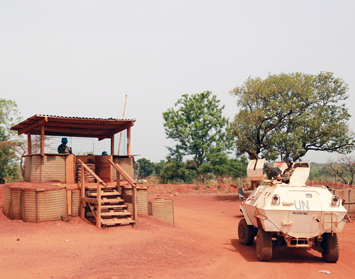
Peacekeepers with the UN Multidimensional Integrated Stabilization Mission in the Central African Republic MINUSCA in Bambari.
|
The current crisis began in December 2012 when the predominantly Muslim-armed coalition, Séléka, launched an armed offensive against the government of François Bozizé resulting in his ouster in March 2013. They rose up in response to what they say were attacks by Mr. Bozizé against Muslims. After assuming power, observers and experts say, Séléka forces continued to commit human rights abuses against the majority-Christian civilian population, including massacres, extrajudicial executions, rape, torture, looting and the wide scale burning and destruction of villages.
Amnesty points out that the Séléka’s leader, Michel Djotodia, resigned from the presidency on January 10, 2014 after significant international pressure. Séléka forces then began to withdraw from cities and towns throughout the CAR, retreated to the northern part of the country but left a power vacuum which anti-balaka militia groups filled by carrying out deadly attacks against Muslims.
This deadly tit-for-tat that has led to a mass exodus of Muslims from the country. Once vibrant Muslim communities in towns and cities have been completely destroyed as Muslim residents have either been killed or driven away. The few left behind live in fear of being attacked by anti-balaka forces.
An African Union peacekeeping force, the African-led International Support Mission to the Central African Republic (MISCA)—supported by French troops—has been deployed in the country since early December 2013, however they have failed to properly protect civilians and prevent ethnic cleansing from taking place.
Haiti devastated by UN actions
In the face of the abuse revelations, Nicole Lee, an international human rights lawyer and activist said UN abuses run deep, but she feels the organization has the means and the tools to address and begin fixing problems.
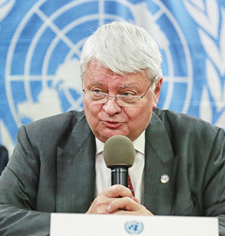
Hervé Ladsous under-secretary-general for Peacekeeping Operations, speaks to media during April trip to Bangui, Central African Republic.
|
As a practicing human rights lawyer in Port-au-Prince, Haiti working with the Bureau Des Avocats Internationaux, Ms. Lee researched and documented claims of human rights abuse during the 1991-94 military coup. She’s always been incensed by the unwillingness of UN officials to accept responsibility for the deadly spread of cholera in Haiti.
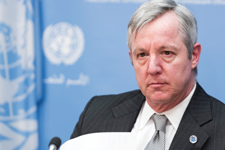
Anthony Banbury, Assistant Secretary- General for Field Support, discusses the latest allegations of sexual exploitation and abuse Jan. 29.
|
“The UN in Haiti has resisted any calls for admonishment and any calls for restitution,” said Ms. Lee, who also worked for the HIV/AIDS advocacy group Global Justice interviewing victims of human rights abuse in Haiti. “They are defending themselves despite a chain of command and proximate cause. The dumping of waste led to this tragedy. They want to make some remedies but won’t admit guilt.”
“Peacekeepers have to own up to the abuses and atrocities. That’s the real issue. If rich White people were being poisoned, the response would be very different.”
The UN: Morally and ethically bankrupt?
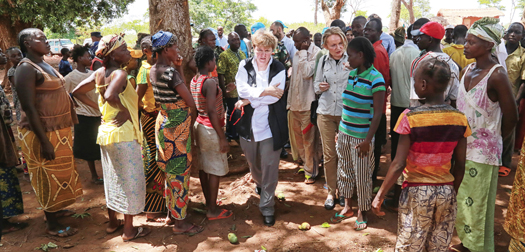
Jane Holl Lute (center) UN special coordinator on improving UN response to sexual exploitation and abuse during April 9 CAR visit.
|
April 11-15 proved to be a busy week with stories breaking about fresh abuses, United Nations officials fending off a cascade of criticism and on the afternoon of April 13, the House Committee on Foreign Affairs Subcommittee on Africa, Global Health, Global Human Rights, and International Organizations held a hearing titled, “Peacekeepers: Allegations of Abuse and Absence of Accountability at the United Nations.”
Among those who testified were Aicha Elbasri, a former UN spokeswoman who was forced out after going public with information hidden by UN officials; Jordie Hannum and Mr. Gallo, an analyst and veteran investigator of sexual abuse and exploitation cases whose application for whistleblower protection was denied, followed by his suspension.
“If peacekeeping is to ultimately address sexual abuse, the responsibility must not sit with UN alone; other member states need to answer the bell. The United States, in particular, can play an important role in the areas of discipline, training, investigative support and vetting personnel,” Mr. Hannum, senior director of the Better World Campaign, told the committee.
He and other witnesses described the sexual exploitation and abuse by peacekeepers as a cancer inside the United Nations.
“Hearing the horrendous reports emanating from CAR, it would be natural to demand withdrawal of all UN peacekeepers before more damage can be done. But this basic instinct to protect needs to be balanced against the good that peacekeepers continue to do there,” said Mr. Hannum. “The UN mission in CAR has played a critical role in reducing ethnic violence, facilitating democratic elections, and fostering the highest economic growth in 15 years.”
The consensus even among the United Nations’ harshest critics is that the organization still plays a significant and meaningful role globally, which makes the reluctance of its leaders to shoulder the blame all the more disheartening.
D.C. attorney Quentin Driskell expressed a commonly held view that an entity separate from the United Nations must assume the responsibility of monitoring mechanisms used to investigate all cases of sexual and other types of abuse. Critics say the UN needs to strip away its immunity, actively enforce measures against sexual abuse and exploitation developed by the organization and remove anyone who commits these crimes as well as those who protect and enable them.
“The idea that you could call the United Nations an impartial peacekeeping force is far from reality. You really don’t want to turn over investigation results to the UN. There’s no way the UN can investigate itself,” said Mr. Driskell, a criminal defense and employment discrimination lawyer in the Washington metropolitan area. “There should be a thorough investigation of what happened and prosecutions to follow. But given what happened in the Congo and Haiti, that won’t happen. Africa would need an alternate tribunal. I wouldn’t trust a tribunal in Europe. But if you set up a tribunal, the UN would be reluctant to send troops. They would feel there is a bias in country. You would have to structure impartial tribunals.”
Mr. Driskell said he wouldn’t trust the French or Europeans to oversee investigations of sex abuse cases occurring in Africa but supports the need for an inspector general.
“Troops from Nepal brought cholera to Haiti which had a devastating effect. But the UN had immunity. That sets the stage to me. The UN goes in, committing actions and doing it with impunity. I would look for an international criminal court. The Inter-American Court of Human Rights is available,” he said.
Mr. Gallo left the agency after filing a lawsuit against his boss, saying she retaliated against him, falsely accused him of crimes and disciplined him after he charged her with misconduct.
“The dysfunction in the UN cannot be attributed to a few rogue officials, nor can it be blamed on those who have retired; it is very deeply ingrained in the culture of the organization,” Mr. Gallo told the committee. “It cannot be remedied by another consultant’s report, another Working Group, new policies, any reorganization or by appointing another ‘Special Coordinator.’”
“This situation is one of moral and ethical bankruptcy. The organization itself has proved unable to do so, so the member states must assume direct responsibility for the investigation of crime and misconduct by UN staff. The solution involves recognizing the need for what is essentially receivership.
“The poorest, the most needy and the most desperate people in this world are being exploited and the only people trying to excuse that are the staff of the United Nations who consider themselves above the law that governs everyone else. This is unconscionable. Privileges and immunities must be stripped as soon as there is cause to believe that a criminal offense has been committed.”
INSIDE STORIES AND REVIEWS
-
-
About Harriett ... and the Negro Hollywood Road Show
By Rabiah Muhammad, Guest Columnist » Full Story -
Skepticism greets Jay-Z, NFL talk of inspiring change
By Bryan 18X Crawford and Richard B. Muhammad The Final Call Newspaper @TheFinalCall » Full Story -
The painful problem of Black girls and suicide
By Charlene Muhammad -National Correspondent- » Full Story -
Exploitation of Innocence - Report: Perceptions, policies hurting Black girls
By Charlene Muhammad -National Correspondent- » Full Story -
Big Ballin: Big ideas fuel a father’s Big Baller Brand and brash business sense
By Bryan Crawford -Contributing Writer- » Full Story






 Click Here Stay Connected!
Click Here Stay Connected!








